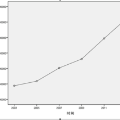Lead time data is compositional data found frequently in the hospitality industry. Hospitality businesses earn fees each day, however these fees cannot be recognized until later. For business purposes, it is important to understand and forecast the distribution of future fees for the allocation of resources, for business planning, and for staffing. Motivated by 5 years of daily fees data, we propose a new class of Bayesian time series models, a Bayesian Dirichlet Auto-Regressive Moving Average (B-DARMA) model for compositional time series, modeling the proportion of future fees that will be recognized in 11 consecutive 30 day windows and 1 last consecutive 35 day window. Each day's compositional datum is modeled as Dirichlet distributed given the mean and a scale parameter. The mean is modeled with a Vector Autoregressive Moving Average process after transforming with an additive log ratio link function and depends on previous compositional data, previous compositional parameters and daily covariates. The B-DARMA model offers solutions to data analyses of large compositional vectors and short or long time series, offers efficiency gains through choice of priors, provides interpretable parameters for inference, and makes reasonable forecasts.
翻译:领先时间数据是酒店行业中经常遇到的组成数据。酒店企业每天都会收取费用,但这些费用必须延迟才能确认收入。为了分配资源,制定商业计划和人力安排,理解和预测未来费用的分布非常重要。在对过去5年的日费用数据进行研究后,我们提出了一类新的贝叶斯时间序列模型——泊松狄利克雷自回归移动平均模型,用于建模未来连续11个30天窗口和1个最后连续35天窗口中将认可的未来费用的比例数据。每天的组成数据都有一个狄利克雷分布,给定均值和比例尺参数。均值通过矢量自回归移动平均过程进行建模,在添加对数比率链接函数进行转换后依赖于先前的组成数据、先前的组成参数和日常协变量。该泊松狄利克雷自回归移动平均模型提供了解决大组成向量和短或长时间序列的数据分析问题的方案,通过选择先验提供效率增益,为推理提供可解释参数,并可作出合理的预测。












